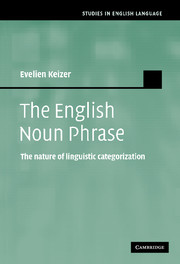Book contents
- Frontmatter
- Contents
- Acknowledgements
- 1 Introduction
- PART I The structural approach: possibilities and limitations
- PART II The cognitive-pragmatic approach: some applications
- 9 The flexibility of language
- 10 Complements and modifiers
- 11 Discontinuous NPs
- 12 Possessive constructions: the author's opinion versus the opinion of the author
- 13 Conclusions
- Bibliography
- Author index
- Subject index
11 - Discontinuous NPs
Published online by Cambridge University Press: 25 January 2010
- Frontmatter
- Contents
- Acknowledgements
- 1 Introduction
- PART I The structural approach: possibilities and limitations
- PART II The cognitive-pragmatic approach: some applications
- 9 The flexibility of language
- 10 Complements and modifiers
- 11 Discontinuous NPs
- 12 Possessive constructions: the author's opinion versus the opinion of the author
- 13 Conclusions
- Bibliography
- Author index
- Subject index
Summary
Introduction
Discussions of displacement of an element from the noun phrase domain typically belong to one of two types: those concentrating on the (largely syntactic) restrictions which apply to displacement and those which are more concerned with the circumstances which favour displacement in situations where the speaker has a choice between two syntactically acceptable word orders. This chapter is primarily interested in the latter type. Nevertheless, for a good understanding of the process of displacement and as a way of introducing the most important notions and issues involved in this process, section II.2 starts with an overview of some important contributions made in this area of research.
Once again, before we start, a note on the terminology used may be in place. In most generative analyses of the kind of constructions discussed in this chapter use is made of the term extraposition, which reflects the assumption that the PP has moved out of (been extraposed from) the NP and placed towards the end of the sentence (e.g. Akmajian and Lehrer 1976; Guéron 1980). Alternatively, the process could be analysed as one of raising: since this type of movement is only allowed in constructions with raising or unaccusative verbs (including passive constructions), it makes more sense for movement theories to regard the subject NP as having moved from a VP-internal position. In either case, the constructions in question involve movement of an element from a base position.
- Type
- Chapter
- Information
- The English Noun PhraseThe Nature of Linguistic Categorization, pp. 264 - 306Publisher: Cambridge University PressPrint publication year: 2007



